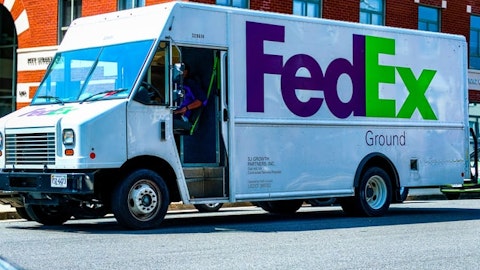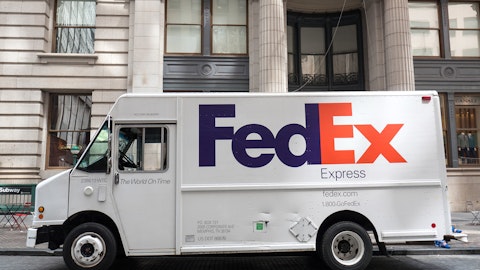Deutsche Bank upgraded FedEx Corporation (NYSE:FDX) to buy from hold, bringing the stock to the same rating that Deutsche has for rival United Parcel Services Inc (NYSE:UPS). This comes after a series of upgrades of both UPS and FedEx in the past few days from analysts who encourage buying. Since the beginning of the pandemic, FedEx shares have been up 176%.
CNBC’s “Squawk on the Street” member Kelly Evans talks about the foreseeable profit margin expansion for FedEx, in the light of the incoming holiday shopping season and thus the surge in e-commerce expected in the next months, as they’re apparently prepared for the demand and rush that might overwhelm the system.
A further reason for this upside could be the distribution of a potential coronavirus vaccine, as FedEx has been investing in advanced freezer technology with the intent of safely transporting the vaccine.

Another thing about this upside for FedEx, says Michael Santoli, is it came just in time for the surge in online delivery, after the concerning downturn in the last two years, and even so, the stocks haven’t yet reached the high they traded for in early 2018.
Overall, hedge funds aren’t very bullish about either of these two stocks, though they prefer Fedex over UPS. The number of bullish hedge fund positions in FDX actually declined from 50 to 47 during the second quarter. The decline in hedge fund enthusiasm towards UPS was even sharper: 48 at the end of March to 37 at the end of June. Our calculations also showed that FDX and UPS aren’t among the 30 most popular stocks among hedge funds (click for Q2 rankings). Third Avenue was one of the hedge funds that were heavily betting on Fedex recently. In its Q1 investor letter, Third Avenue said the following about Fedex:
“FedEx operates one of the world’s largest package delivery and logistics businesses. Beginning in the early 1970s, founder Fred Smith began building a network of sorting facilities, aircraft and last-mile capabilities that has become one of very few key players in an oligopolistic market dominated by operators who have scale and control of a variety of key assets that are virtually impossible to replicate. In spite of its record of creating extraordinary shareholder value over decades, FedEx has had a number of operational headwinds over the last few years. First, the expansion and evolution of its ground delivery services in order to meet rapidly growing ecommerce demand has required costly investment and created inefficiencies in the FedEx Ground network in the near-term. Secondly, in 2016, FedEx acquired TNT to expand its European operations and grow scale within its FedEx Express line of business. This is a business that was already inherently less profitable and more capital intensive than its FedEx Ground business. From an integration perspective, the TNT acquisition has proved more difficult and a larger headwind to operating performance than anticipated. Meanwhile, political impediments to global trade in 2019 compounded the challenges for FedEx Express, which is primarily a business to business service. We have developed the view that FedEx’s substantial investments to continue supremacy for decades to come in an evolving ecommerce market place are sensible and strategic. We also believe that the costs associated with the TNT integration will dissipate in coming quarters and that FedEx management is strategically positioning FedEx to maintain its critical status in the secularly growing package delivery oligopoly. Over time we would expect FedEx to navigate a return towards historical levels of profitability and returns on capital, in addition to meaningfully growing overall business volume in the future. Our estimates suggest that this should also result in a substantially higher share price. As it stands today, the company is valued at roughly 10x depressed trailing earnings.”
We brought Third Avenue’s bullish thesis to your attention months ago. Wall Street analysts are upgrading the stock AFTER the fact. Where were they when Fedex shares were trading below $100? If you don’t want to miss a compelling investment idea next time we publish it, you should subscribe to our free daily enewsletter below:
Click here if you don’t see the subscribe box.




